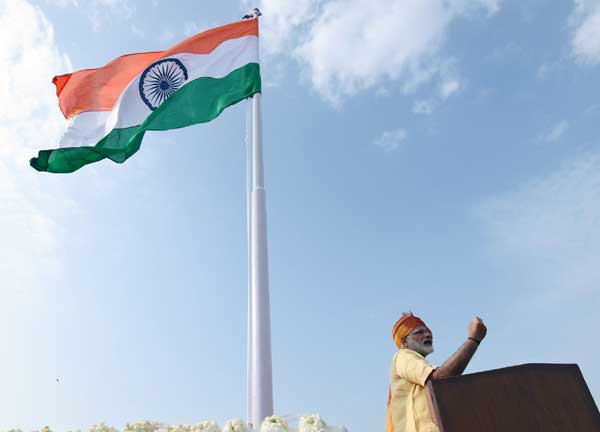 In recent years, some countries in SAARC which earlier had deep strains with India, have sought to improve ties with New Delhi. Two instances of this are Bangladesh and Sri Lanka (which have clocked high growth rates in recent years). They have built robust economic linkages and avoided being part of what was often dubbed an ‘anti-India’ group, led by Pakistan.
In recent years, some countries in SAARC which earlier had deep strains with India, have sought to improve ties with New Delhi. Two instances of this are Bangladesh and Sri Lanka (which have clocked high growth rates in recent years). They have built robust economic linkages and avoided being part of what was often dubbed an ‘anti-India’ group, led by Pakistan.
The most recent instance of India and other countries finding common ground was when the SAARC (South Asian Association for Regional Cooperation) Summit in 2016 was cancelled after India’s refusal to attend, in protest against the terror attack on a military base in Uri, resulting in the deaths of 19 Indian soldiers. Three other SAARC countries – Bangladesh, Bhutan and Afghanistan – also backed India’s stance, and both Bangladesh and Bhutan issued very strong statements echoing India’s concerns on terrorism.
The Bangladesh government stated, “The growing interference in the internal affairs of Bangladesh by one country has created an environment, which is not conducive to the successful hosting of the 19th SAARC summit in Islamabad in November 2016”.
In recent months, Pakistan has been trying not just to gain legitimacy in the SAARC region, but also to emerge as a key player in South Asia.
Former Pakistan Prime Minister Shahid Khaqan Abbasi visited Nepal in March 2018 and discussed the progress of the China Pakistan Economic Corridor (CPEC) while seeking the revival of the SAARC Process. Abbasi also announced the doubling of scholarship quotas for Nepali students wanting to pursue higher studies in Pakistan.
Army Chief, Qamar Javed Bajwa visited the Maldives in April 2018. The Pakistan Army Chief was the first high level dignitary from any country to visit Maldives after the emergency, imposed in February 2018, was lifted.
During Bajwa’s visit, defence cooperation between Maldives and Pakistan was discussed. The items discussed were closer linkages between Maldives’ National Counter Terrorism Centre NCTC and counterparts in Pakistan, and joint patrolling of the Exclusive Economic Zone (EEZ) which so far, had been India’s exclusive domain, jointly with Maldives). According to a 2016 agreement between India and Maldives, both countries were setting up a coastal surveillance radar system for real-time surveillance of the EEZ of Maldives.
Like Abbasi in Nepal, Bajwa also sought to strengthen people to people links between Maldives and Pakistan.
What came as a major surprise to New Delhi, however, is the MoU signed between Pakistan and Maldives’ State Electric Company (STELCO) and Water and Power Development Authority (WAPDA), to assist in capacity building of STELCO. Some of the key provisions of this MOU are greater interaction between employees of both organisations, increased visits to learn from each other’s experiences and participation of STELCO employees in WAPDA training programmes.
This comes with some other decisions which have aggravated a downward spiral in Male’s ties with New Delhi, including the cancellation of work permits of Indians and the Maldives government’s decision to ‘return’ two search-and-rescue helicopters gifted by India in 2016. The current Maldivian President Abulla Yameen has a clear pro-China slant. Under his leadership, Maldives’ ties with Pakistan have also bloomed.
Commenting on some of Male’s recent decisions, an Indian official said, “Given its precarious financial situation, Pakistan cannot do much to help to the Maldives. But President Yameen is trying his best to reduce India’s footprint and bring in elements hostile to India to undermine Indian influence in the Maldives.”
Every country is free to pursue economic ties the way it wishes too. What India should be clear about is that China-Pakistan links are no longer limited to the CPEC. Beijing would be attempting to create a situation where Pakistan, with support from China, can create irritants for India within South Asia (to ensure it is confined within South Asia). While Maldives and Nepal already have pro-China leaderships, the possible election of pro-China faces in Sri Lanka and Bangladesh will further increase India’s challenges in South Asia.
For India, it is important first to go back to the drawing board and do a serious appraisal of the current state of ties with neighbouring countries, rather than linking serious foreign policy issues, to domestic politics and moving from event to event. The Narendra Modi government’s approach towards even complex issues in the neighbourhood has occasionally been excessively simplistic, and there has been too much focus on the optics.
Second, New Delhi needs to focus on delivery of economic projects, and its approach of finding common ground with Japan in South Asia, especially in countries like Sri Lanka and Bangladesh, is appropriate in this context. Similar attempts should be made in other countries, given that Tokyo has been successful in making inroads in Chinese strongholds in South Asia as well as South-East Asia.
Third, New Delhi should focus on the Indo-Pacific narrative and it should not be averse to cultivating strong ties with Taiwan to send a firm message to China. While summits like Wuhan may make for good optics, and the Chinese leadership is never short of platitudes, New Delhi needs to recalibrate its South Asia policy.
After the July 2018 elections, the China-Pakistan nexus could become even stronger, especially if the victor is a proxy of the Pakistan army. New Delhi clearly has its task cut out in the neighbourhood and summitry needs to give way to substance.




